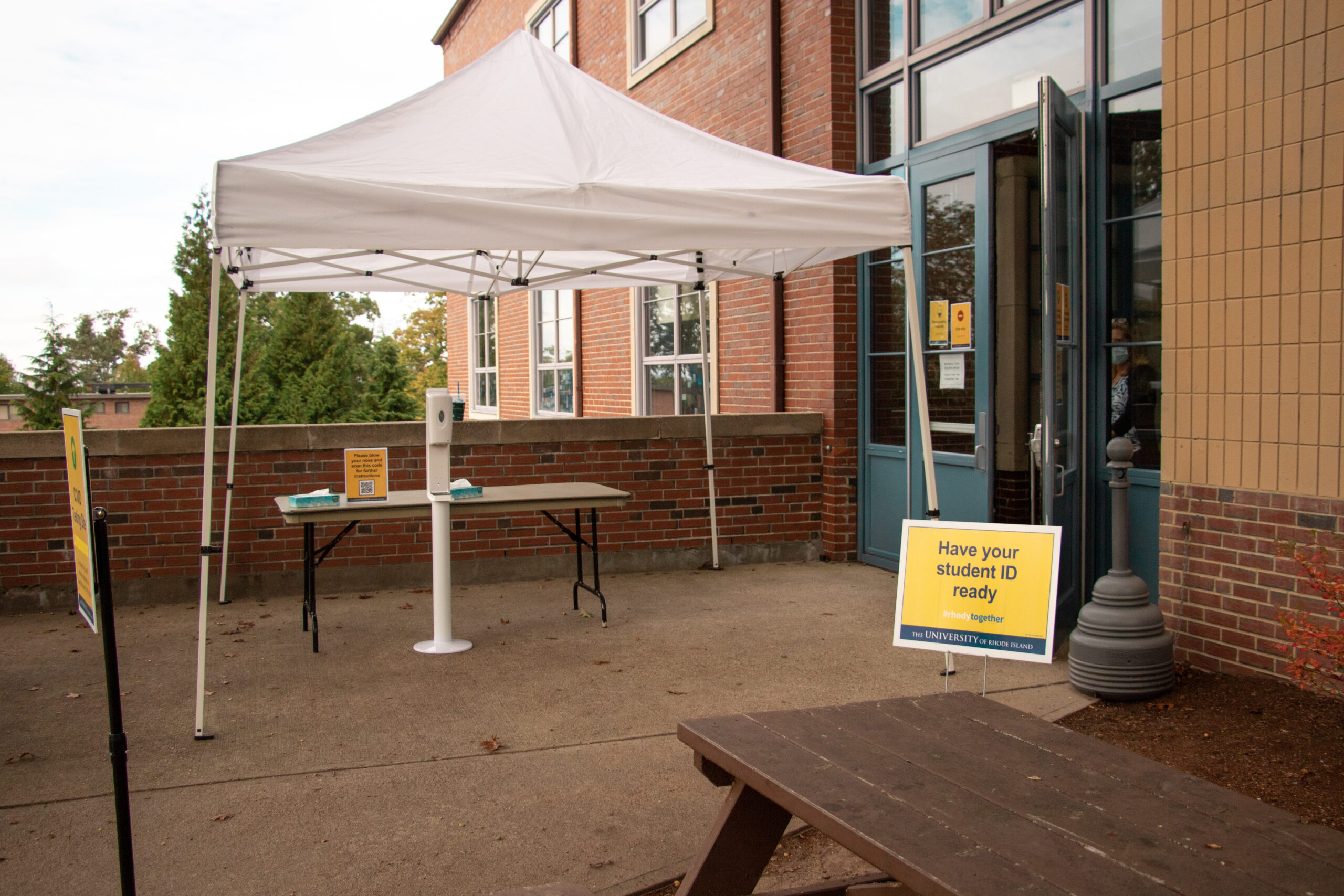URI is working hard to keep COVID-19 positivity rates down. Photo by Siobhan Richards.
This week, the Cigar spoke with administration about the new mandatory COVID-19 testing for all, the inevitably of a rise in positive cases and the continued discouragement of large group gatherings both on and off campus.
Mandatory COVID-19 testing for all URI students
On Oct. 5, URI Communications released a statement to the entire URI community stating that effective immediately, mandatory COVID-19 testing for all students living on and off campus would be implemented.
The Rhode Island Department of Health (RIDOH) is working alongside the University in assessing the overall health of the student body and collecting data to determine the population health leading into the end of the fall semester.
“It was determined that it was time to get a baseline reading of what is the prevalence of the virus in our campus community,” said Vice President for Student Affairs Kathy Collins. “The large majority of cases have been off campus. So we know that that is a rather large geographic spread that goes from Eastward down to Point Judith.”
According to Collins, students living out of state and attending classes completely online do not have to be present for the University-mandated testing.
There have been two testing sites set up for asymptomatic testing: in the Memorial Union Atrium and the Ryan Center parking lots. The testing procedure continues to be self collected and painless, according to the statement released by the University.
It is recommended that any student experiencing COVID-19 symptoms not show up for a test, but rather call URI Health Services to schedule a test and telehealth meeting.
Students who fail to show up for their scheduled testing will be referred to the Dean of Students Office and with a violation of the URI Student Handbook, according to the University.
“Everyday we’re going to run our lists,” Collins said. “We’re going to know who is invited to come and get tested and who came. If students refuse to come and refuse to get tested, we certainly will talk to them. This is mandatory and this is part of the handbook. They will be referred to Student Conduct where they will have due process, but they will certainly face sanctioning.”
Collins said that if the University sees a large increase in cases, the same process of putting students who test positive in isolation will continue. If a student has been in contact with someone who has tested positive for COVID, they will be instructed to quarantine. Collins also wants to encourage students to “put our community first” and answer the calls from the contact tracers.
There were 670 tests distributed on Oct. 6 and 360 tests distributed Oct. 5. Seventy-five percent of people invited to receive testing were students and 25 percent were faculty and staff. Collins expects these numbers to double following the opening of the Ryan Center drive-thru testing centers.
“The more we know, the more information we have,” she said.
Large group gatherings continue on and off campus
Despite the pandemic, large numbers of students continue to gather outside various residence halls, often without masks. Collins said these groups have maintained a relatively consistent size, although they are still way over the University and Centers for Disease Control and Prevention (CDC) recommended 15 people in total. However, Collins explained why being realistic in regards to who is participating in this upsetting behavior is important.
“’I’ve heard people say ‘it’s all those freshmen’ and ‘we are going to get sent home;’ that is not at all true,” Collins said. “Certainly there are individuals in the groups that are not first-year students or returning students. There [are] on-campus and off-campus [students]; we have found some non-students. People from the local communities, high schools, friends coming from other colleges and those types of things.”
According to Collins, the University is working closely with the URI Police, Housing and Residence Life, the dean of students and others to brainstorm more ways to even further discourage these events. Large gatherings on campus are in violation of the student handbook in accordance with the new COVID-19 rules and regulations.
“ I know people are like, ‘why aren’t the police arresting anybody?’ They can’t,” said Collins. “We do want [people] to know that when we come up to these groups, a lot of people run. So it’s not as easy for us to identify people.”
Outside of the on campus clusters, students living in Narragansett are also warned to keep their gatherings of 15 or less of the same people.
“We do recognize that some of our students have taken that to mean, ‘well, now I’m with a group of 15, and later tonight I’m going to meet with another group of 15,’” Collins said. “It’s wrong. I think our students have heard the concept of 15, but I think they are hanging out with multiple groups, in different social settings.”
According to Collins, many of the positive cases recorded have been from the virus spreading through people riding together in cars. She, and the University, want to encourage students living off campus to wear their masks at all social gatherings and to show up for testing.
“We [the URI community] are very relational,” Collins said. “People are friendly; this is just not the best time to be as friendly as we want to be.”
Resources
Health Services can be reached at 401-873-2246.
Students can call the Counseling Center at 401-874-2288. The center’s normal business hours are Monday, Thursday and Friday 8:30 a.m. to 4:30 p.m. and Tuesday and Thursday 8:30 a.m. to 6:30 p.m. Outside of operating hours, students will be connected to ProtoCall, which provides behavioral health services over the phone.
The Psychological Consultation Center can be reached at 401-874-4264, and the Couple and Family Therapy Clinic can be reached at 401-874-5956.
For more information and stories in the coming days, check our website and Twitter @rhodycigar.





